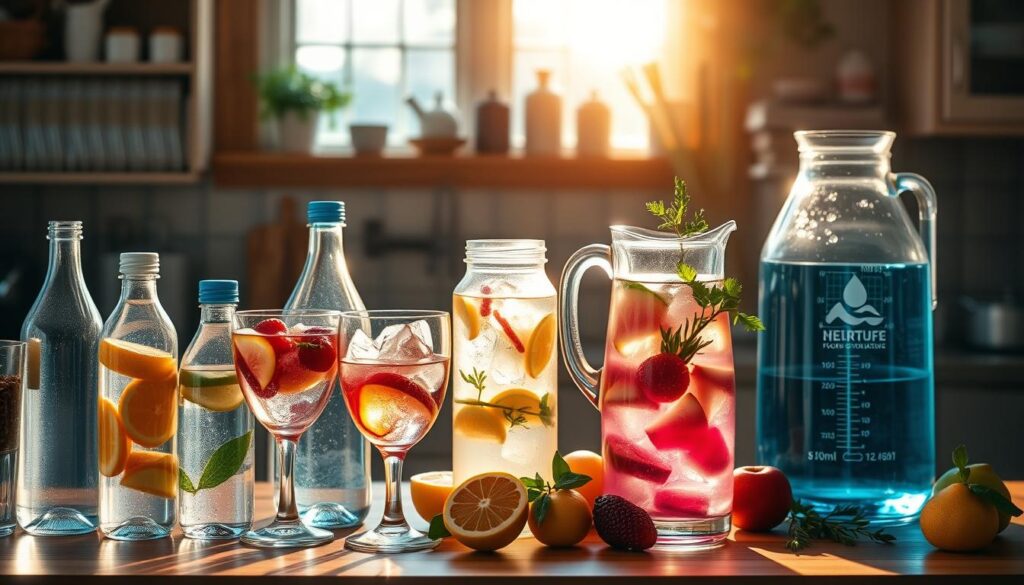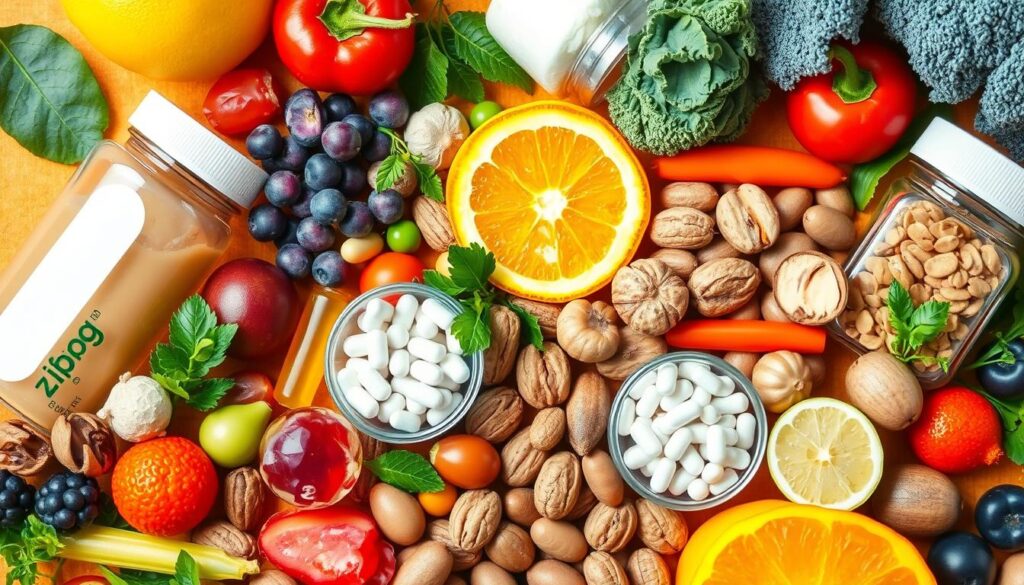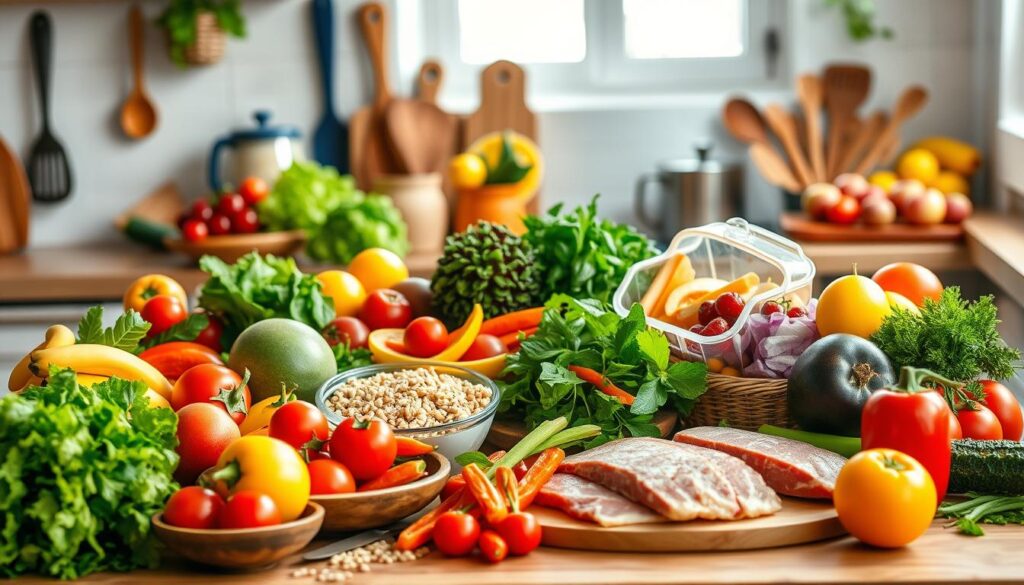Did you know that 92% of older adults have at least one chronic disease, and 77% have at least two? This fact shows how vital senior nutrition is for staying healthy. As we get older, our bodies change a lot. So, eating right is more important than ever.
Eating well does more than just fill our stomachs. It helps keep our bodies strong, full of energy, and healthy. For people over 60, a balanced diet can lower the risk of diseases like high blood pressure, diabetes, and heart disease.
Understanding and meeting the nutritional needs of older adults is key to healthy aging. This guide will cover important nutrients, the role of protein, how to stay hydrated, and tips for eating well in later life.
Key Takeaways
- Proper nutrition is key to preventing chronic diseases in older adults.
- A balanced diet should focus on foods with lots of nutrients and less sugar and unhealthy fats.
- Getting enough protein is important for keeping muscle mass in seniors.
- Staying hydrated is harder but still very important as we age.
- Overcoming eating barriers might mean making lifestyle changes and getting support.
Table of Contents
Understanding Unique Nutritional Needs of Seniors
As we age, our bodies change, and so do our nutritional needs. Senior nutrition requirements differ from those of younger adults. It’s important to understand these shifts for healthy aging.
Age-related changes affecting nutrition
Older adults often have a slower metabolism, eat less, and notice changes in taste and smell. These changes can affect what foods they choose and how well they absorb nutrients. Seniors need fewer calories but require more nutrient-dense foods to stay healthy.
Essential nutrients for older adults
A balanced diet for seniors should focus on key nutrients:
- Protein for muscle maintenance
- Calcium and vitamin D for bone health
- Fiber for digestive health
- B vitamins for energy and brain function
Importance of balanced diet in disease prevention
Eating a variety of nutrient-rich foods is key to preventing diseases. A well-balanced diet can lower the risk of chronic conditions like high blood pressure, diabetes, and heart disease in older adults.
| Food Group | Benefits | Examples |
|---|---|---|
| Fruits and Vegetables | Rich in antioxidants and fiber | Berries, leafy greens, citrus fruits |
| Whole Grains | Provide sustained energy and fiber | Quinoa, brown rice, oatmeal |
| Lean Proteins | Support muscle health | Fish, poultry, beans |
| Healthy Fats | Promote heart and brain health | Olive oil, avocados, nuts |
Understanding and addressing these unique dietary needs can significantly enhance seniors’ health and well-being. For more insights on maintaining overall fitness, check out these helpful fitness tips for beginners, which can be adapted for older adults.
The Importance of Nutrient-Dense Foods
As we get older, our bodies need fewer calories but more nutrients. Choosing nutrient-dense foods is key for staying healthy and full of life. Foods rich in vitamins, minerals, and fiber can prevent chronic diseases and boost well-being.
Nutrient-dense foods are packed with nutrition but low in calories. They include colorful fruits and veggies, lean proteins, whole grains, and low-fat dairy. These foods help older adults get the nutrients they need while keeping their weight in check.
Studies show that older adults usually eat better than other groups. But, there’s still a lot to improve. Many seniors don’t get enough protein, especially those over 71. Also, vitamin B12 levels often drop with age, so fortified foods or supplements are needed.
| Nutrient | Importance | Food Sources |
|---|---|---|
| Protein | Maintains muscle mass | Lean meats, fish, eggs, beans |
| Vitamin B12 | Supports nerve function | Fortified cereals, fish, meat |
| Fiber | Aids digestion | Whole grains, fruits, vegetables |
| Omega-3 fatty acids | Promotes heart health | Fatty fish, walnuts, flaxseeds |
Adding these nutrient-dense foods to daily meals can greatly improve a senior’s diet. It’s important to try different textures and flavors to make meals fun. Eating with family and friends can also make food more enjoyable and encourage better eating habits for older adults.
Protein: Maintaining Muscle Mass in Later Years
As we age, keeping our muscles strong is key to staying healthy and independent. Protein is crucial for this. Let’s look at why protein is important and how seniors can get enough of it.
Recommended Protein Sources for Seniors
Seniors should eat a variety of easy-to-digest proteins. Lean meats, fish, poultry, eggs, and dairy are great choices. For those eating plant-based, beans, lentils, and soy products are good too. PeakDro’s nutrition experts suggest eating different proteins to get all the amino acids needed.
Benefits of Adequate Protein Intake
Eating enough protein helps older adults in many ways:
- It keeps muscles strong and big
- Helps bones stay healthy
- Speeds up recovery from sickness or injury
- Boosts immune function
- Helps wounds heal
Balancing Protein Needs with Kidney Health
Protein is vital, but older adults with kidney problems need to be careful. They should talk to doctors to figure out how much protein is right for them. Finding the right balance is important for staying well as we age.
| Age Group | Recommended Daily Protein Intake | Example Sources |
|---|---|---|
| 65+ years | 1.0-1.2 g per kg of body weight | 3 oz chicken breast, 1 cup Greek yogurt, 1/2 cup lentils |
| 75+ years | 1.2-1.5 g per kg of body weight | 4 oz salmon, 2 eggs, 1 cup cottage cheese |
Eating high-quality proteins and spreading them out during the day helps seniors keep their muscles strong. Adding regular exercise and good nutrition is key to aging well.
Hydration: Staying Well-Watered as We Age

As we get older, drinking enough water is key for our health. Many seniors don’t drink enough water, which is bad for their health. In fact, up to 40% of elderly people might not have enough fluids in their bodies.
The National Academy of Medicine suggests older men should drink about 13 cups of fluids a day. Women over 51 should aim for 9 cups. A good way to remember is to drink half an ounce of fluids for every pound of your weight. This approach to staying hydrated can prevent dehydration and its risks.
“Proper hydration is not just about quenching thirst; it’s about nourishing our bodies and minds as we age.”
It’s important to prevent dehydration in seniors. Signs you might not be drinking enough fluids include dark urine, feeling tired, dizzy, or confused. To drink more fluids, eat foods like cucumbers, watermelon, and tomatoes. These foods are great for people who find it hard to drink enough water.
| Hydration Source | Benefits |
|---|---|
| Water | Essential for all bodily functions |
| Fruits and Vegetables | Provide fluids and nutrients |
| Low-fat Milk | Hydrates and offers calcium |
Drinking enough water helps with thinking clearly and prevents health issues like urinary tract infections and heart problems. By drinking plenty of fluids, older adults can live better and healthier lives.
Nutrition for Older Adults: Key Dietary Guidelines
Healthy eating is key for older adults to stay well and prevent chronic diseases. Following dietary guidelines can greatly improve life quality. Here are some tips for seniors to make better food choices.
Incorporating fruits and vegetables
A colorful plate is essential for a balanced diet. Try to fill half your plate with fruits and vegetables. These foods are packed with vitamins, minerals, and fiber. Seniors need 30 grams of fiber a day for men and 21 grams for women aged 51-71+. Sadly, most adults don’t get enough fiber.
Choosing whole grains
Whole grains are richer in nutrients and fiber than refined grains. They help keep blood sugar levels steady and support digestive health. Consider switching to whole grain bread or trying quinoa and brown rice. These choices can help you meet your fiber needs and give you energy that lasts.
Limiting added sugars and unhealthy fats
It’s important to cut down on added sugars and unhealthy fats for senior nutrition. The Dietary Guidelines suggest limiting added sugars to 10% of daily calories. Choose healthy fats from avocados, nuts, and olive oil. Aim to reduce saturated fat to 10% of daily calories for heart health.
These guidelines are general. Always talk to a healthcare provider for advice that fits your needs and health conditions. By following these guidelines, you can lead a healthier, more vibrant life.
Vitamins and Minerals: Bridging Nutritional Gaps
As we get older, our bodies change. This affects how we absorb and use nutrients. Senior vitamin needs often increase, making mineral supplements for older adults very important. Many seniors face nutritional gaps that can affect their health and well-being.

Vitamin D deficiency is common in older adults because they get less sun. This can lead to more falls, fractures, and a weaker immune system. Calcium intake often drops in seniors, which can cause bones to lose density and increase the risk of osteoporosis.
Vitamin B12 is another nutrient seniors need to watch out for. Many older adults have trouble absorbing B12, which can cause anemia, fatigue, and memory issues. Magnesium deficiency is also common in the elderly, leading to muscle cramps and trouble sleeping.
- Vitamin D: Supports bone health and immune function
- Calcium: Essential for strong bones and teeth
- Vitamin B12: Vital for neurological function and red blood cell formation
- Magnesium: Important for muscle and nerve function
Nutritional supplements can help fill these gaps. Multivitamin-mineral supplements provide essential nutrients, which complement a balanced diet. For specific deficiencies, individual nutrient supplements may be recommended. It’s important to talk to healthcare professionals before starting any supplement, as some can interact with medications or have negative effects if taken too much.
When picking supplements, choose products that have been tested by third-party organizations to ensure they are safe and of good quality. Remember, supplements can be helpful but shouldn’t replace a diet rich in nutrients. Try to get most of your nutrients from whole foods and use supplements only when needed.
Managing Calorie Intake for Healthy Weight
As we get older, our bodies need fewer calories. It’s important to understand these changes for managing weight in older adults. Seniors still need important nutrients even with fewer calories.
Understanding Changing Caloric Needs
Seniors have slower metabolisms, so they need fewer calories. A 250-pound person might aim to lose 25 pounds over six months, or about one pound each week. Losing 10% of their weight can help with blood sugar, blood pressure, and cholesterol.
Strategies for Weight Management
Managing weight in older adults means balancing diet and exercise. Try to cut 500 calories a day, but don’t go below 1,200 for women or 1,600 for men. Choose foods that are full of nutrients from all groups. Regular exercise is key – 150 to 300 minutes of moderate activity each week helps keep muscles strong and overall health good.
Importance of Portion Control
For seniors, controlling how much they eat is key to staying at a healthy weight. Use tools like MyPlate to see what a balanced meal looks like. Remember, muscle weighs more than fat, so focus on the balance of your body, not just your weight.
| Weight Management Strategy | Recommendation |
|---|---|
| Calorie Reduction | 500 calories/day |
| Weekly Weight Loss Goal | 0.5 – 2 pounds |
| Physical Activity | 150-300 minutes/week |
By using these strategies, older adults can keep a healthy weight. This reduces the risk of heart disease, diabetes, and other health problems linked to weight changes later in life.
Overcoming Barriers to Healthy Eating in Later Life
As we get older, eating well is key, but it can be tough. Seniors often face challenges like physical and financial issues. Knowing these hurdles helps us find ways to plan meals that work for older adults.
Many seniors eat less or have trouble chewing. The National Poll on Healthy Aging found 20% of people aged 65-80 had trouble eating and chewing in the past two years because of dental problems. If you’re having trouble, talk to your dentist. Adding fresh herbs, spices, or lemon juice to food can also help make it taste better.
Money can also be a big problem for eating well. The U.S. Department of Agriculture’s Thrifty Food Plan shows seniors are spending more on food, with costs going up by $14-$18.90 from 2021 to 2023. To save money, look into programs like SNAP or Meals on Wheels, which helps people in 5,000 U.S. communities. Also, buying store-brand products and using grocery ads can help plan meals on a budget.
Dealing with these challenges often means taking a few steps. Try to move more to help increase your appetite. Eat smaller, more frequent meals. And don’t be afraid to get medical advice if you keep losing your appetite or have health worries. With the right strategies and support, you can eat well and enjoy good health as you age.
FAQ
How do nutritional needs change as we age?
As we get older, our bodies change. We need more protein, calcium, vitamin D, vitamin B12, and fiber. These nutrients help keep us healthy and prevent diseases.
Why are nutrient-dense foods important for older adults?
Nutrient-dense foods help older adults get the nutrients they need without eating too many calories. Foods like fruits, vegetables, whole grains, lean proteins, and low-fat dairy are great choices. They are full of vitamins, minerals, and fiber.
Why is protein intake crucial for older adults?
Protein is key for keeping muscle mass in older adults. It helps keep muscles strong, supports bones, and helps with recovery from illness or injury.
How can older adults ensure proper hydration?
Older adults need to drink enough water because they might not feel thirsty as much. They should drink water all day, even if they don’t feel thirsty. Other good drinks include low-fat or fat-free milk, lactose-free options, fortified soy beverages, and 100% juice.
What are some key dietary guidelines for older adults?
Important dietary tips include eating a variety of fruits and vegetables, choosing whole grains, and eating less sugar and unhealthy fats. Eating a colorful plate with different foods makes sure you get all the nutrients you need.
Which vitamins and minerals are important for older adults?
Older adults need certain vitamins and minerals like calcium and vitamin D for bones, vitamin B12 for the brain, and potassium for the heart. Always talk to a healthcare provider before taking supplements.
How can older adults manage their calorie intake for healthy weight?
Older adults need fewer calories because their metabolism slows down. To manage weight, choose foods that are full of nutrients, eat smaller portions, and stay active. Knowing how much to eat is key to keeping a healthy weight.
What barriers to healthy eating might older adults face?
Older adults might find it hard to eat well because they might not want to eat, have trouble chewing or swallowing, can’t move easily, or can’t afford food. Ways to overcome these challenges include trying meal delivery services, using tools that make cooking easier, eating softer foods, and finding community help for nutrition.

Hey, I am Dr. Jenna Calloway. What you put into your body is what, intrinsically, makes the difference between success and burnout. Healthy food is fuel, and after years of working with high-performing professionals, I’ve put together nutrition strategies that are not only healthy but delicious and realistically easy to fit into your busy life. Whether you’re powering through a hectic day or looking to elevate your workouts, let me guide you on the path toward feeling your absolute best!

